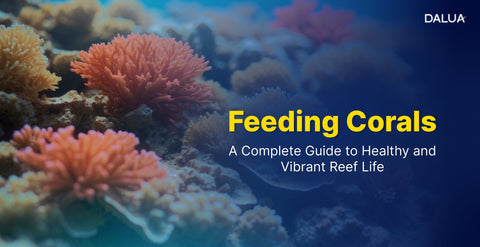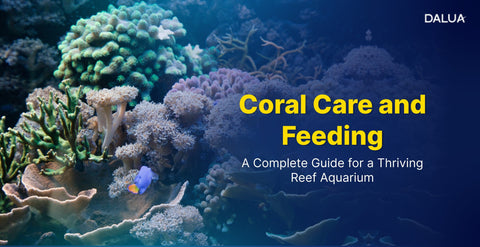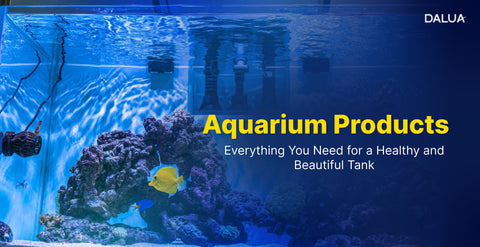Coral Care and Feeding: How to Keep Your Reef Tank Thriving
Owning a reef aquarium is one of the most rewarding parts of the marine hobby. Watching colorful corals open, feed, and grow is both mesmerizing and satisfying. But corals aren’t just decorations they’re living, breathing organisms that rely on the right light, flow, water chemistry, and nutrition.
Whether you’re starting your first reef tank or refining your coral husbandry, this guide breaks down everything you need to know about coral care and feeding, so your marine ecosystem thrives for years to come.
Understanding Coral Biology
Corals are made up of tiny animals called polyps, which live in colonies. Inside these polyps are symbiotic algae known as zooxanthellae. These algae photosynthesize, providing food and energy to their coral hosts. In return, corals offer them shelter and access to sunlight.
However, light alone isn’t enough for coral survival. In the wild, corals also feed on plankton, organic matter, and dissolved nutrients. Successful coral care involves replicating this delicate balance between light-based energy and external feeding.
Essential Coral Care Basics
Before focusing on feeding, it’s important to ensure your reef tank provides stable living conditions. Corals thrive in consistency, and even small fluctuations can cause stress or tissue loss.
Here’s what to maintain:
1. Lighting
- Corals depend on light for photosynthesis, powered by their symbiotic algae.
- Use high-quality LED reef lighting with full-spectrum output (especially blue and UV).
- Soft corals and LPS (Large Polyp Stony) corals need moderate light, while SPS (Small Polyp Stony) corals prefer stronger intensity.
- Always acclimate corals slowly to lighting changes to avoid bleaching.
2. Water Flow
- Corals need consistent water movement to deliver nutrients and oxygen while removing waste.
- Use wavemakers or gyre pumps to simulate natural ocean currents.
- SPS corals like strong, turbulent flow, while soft corals prefer gentle, indirect movement.
3. Water Parameters
Keeping your parameters stable is more important than chasing perfect numbers. As a guide:
- Temperature: 24–26°C (75–79°F)
- Salinity: 1.025–1.026 SG
- pH: 8.0–8.4
- Alkalinity: 8–12 dKH
- Calcium: 400–450 ppm
- Magnesium: 1250–1350 ppm
- Nitrate: <10 ppm
- Phosphate: <0.05 ppm
Use reliable test kits and adjust slowly if needed. Regular water changes and dosing systems can help maintain balance.
Feeding Corals: What They Eat and Why It Matters
Corals derive up to 80% of their energy from light, but feeding provides critical nutrients that enhance color, growth, and resilience. There are three main ways corals get food:
1. Photosynthesis (via Zooxanthellae)
The internal algae convert light into energy. This is why good lighting is the foundation of coral health.
2. Absorption of Dissolved Nutrients
Corals absorb amino acids and trace elements directly from the water. Maintaining trace elements through dosing or water changes supports metabolic activity.
3. Direct Feeding
Corals can capture plankton and micro-food using their tentacles. This is where your role comes in.
Types of Coral Foods
When choosing coral food, match it to your coral type and polyp size:
1. Phytoplankton
- Ideal for soft corals, gorgonians, and filter feeders.
- Provides essential fatty acids and pigments that enhance color.
2. Zooplankton
- Great for LPS and non-photosynthetic (NPS) corals.
- Contains proteins that boost growth and skeletal formation.
3. Powdered Coral Foods
- Fine particles for SPS and small-mouthed species.
- Easy to dose and mix with tank water.
4. Liquid Coral Foods
- Convenient all-in-one nutrition solutions.
- Can be broadcast-fed or spot-fed with a pipette.
5. Amino Acids & Trace Supplements
- Strengthen tissue and improve polyp extension.
- Use high-quality, reef-safe formulations and dose carefully.
Feeding Methods
1. Broadcast Feeding
Mix coral food with tank water and pour it evenly across the aquarium. This method ensures all corals receive some nutrition but can increase nutrients if overdone.
2. Target Feeding
Use a pipette or turkey baster to gently squirt food directly onto coral polyps. This is more efficient and reduces waste.
3. Automatic Dosing
For advanced reefers, dosing pumps can deliver amino acids or liquid food in small amounts throughout the day. This keeps nutrient levels stable.
How Often Should You Feed Corals?
- Soft corals & SPS: 1–2 times per week
- LPS & NPS corals: 3–4 times per week or daily (for NPS species)
- Monitor water quality. Overfeeding can increase nitrates and phosphates, leading to algae issues.
Remember, consistency is key. Feed regularly in small amounts rather than large, infrequent meals.
Common Coral Feeding Mistakes
- Overfeeding without nutrient control
- Using poor-quality or expired food
- Feeding during strong lighting (many corals feed better at night)
- Ignoring individual species needs
- Neglecting flow during feeding (low flow helps corals capture food more easily)
Expert Coral Care Tips
- Always turn off powerheads during spot feeding to prevent food from drifting away.
- Feed at dusk when corals naturally extend their tentacles.
- Observe coral behavior—if polyps remain closed, check water parameters first.
- Supplement calcium and alkalinity regularly for hard corals.
- Quarantine new corals to prevent pests or diseases.
Bringing It All Together
Proper coral care and feeding require patience, observation, and balance. By combining strong lighting, stable water chemistry, good flow, and targeted nutrition, you can build a thriving reef ecosystem full of vibrant, healthy corals.
At Dalua, you’ll find everything you need to make coral care easier — from professional-grade lighting and pumps to dosing systems and filtration gear. With the right equipment and routine, your reef can flourish for years to come.





